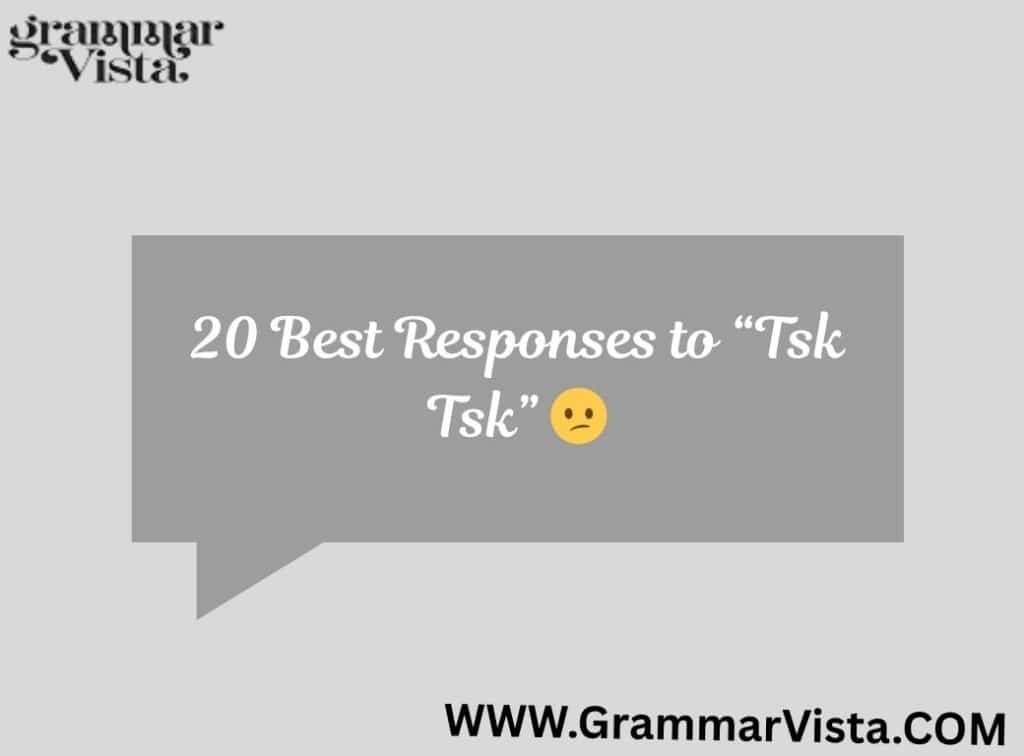Have you ever felt the sting of a disapproving “tsk tsk” echoing in your ears? This seemingly innocuous sound can carry a weight of judgment that leaves us questioning our choices and actions. In this reading, we’ll explore the 20 best responses to this often frustrating remark, empowering you to reclaim your voice and assert your confidence. Whether you’re facing criticism at work or among friends, mastering these comebacks will help you navigate those awkward moments with ease.
Understanding Tsk Tsk Meaning in Chat
“Tsk tsk” is a sound that transcends languages and cultures, acting as a universal marker of disapproval or mild criticism. This seemingly simple vocalization carries layers of meaning, often reflecting social norms and personal values. When someone lets out a “tsk tsk,” it’s not just about the action at hand; it is an unspoken commentary on the expectations we hold for one another. It can serve as a gentle nudge towards better behavior or a subtle reminder of societal standards, inviting reflection on one’s choices.
1. “Oops! My bad!”
When you want to address a small mistake with humor, responding with “Oops! My bad!” can diffuse tension and lighten the mood. This playful acknowledgment not only shows that you’re aware of your slip-up but also invites laughter and camaraderie.
Using humor in these situations can strengthen relationships by showcasing your ability to laugh at yourself. It signals to others that you don’t take life too seriously, which can be refreshing in our often overly critical world.
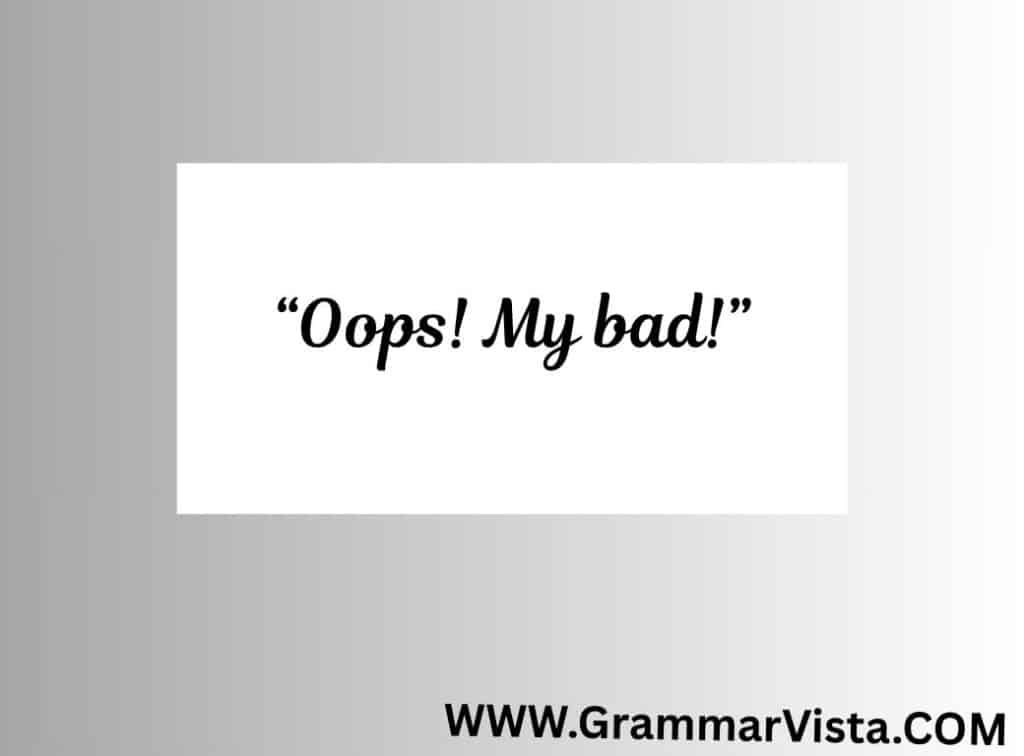
Example: Aunt Mary spots you spilling your drink at a family gathering. Instead of getting defensive, your light-hearted response allows everyone to share a chuckle, turning a minor mishap into a memorable moment.
2. “I’ll do better next time!”
When you want to demonstrate your commitment to doing better in response to a “Tsk Tsk,” saying, “I’ll do better next time!” showcases a proactive attitude. This phrase acknowledges the critique and also emphasizes a willingness to learn and grow from the experience. It’s a powerful way to turn a potentially negative interaction into an opportunity for self-improvement.
In a personal context, if a friend points out that you’ve been neglecting your commitments, responding with, “I’ll do better next time!” conveys accountability and strengthens your relationship by showing that you care about their feelings.
Example: If you mismanaged a project at work and received a “Tsk Tsk” from your manager, this response can help shift the conversation toward future solutions rather than dwelling on past mistakes.
3. “Thanks for the reminder!”
When someone says “Tsk tsk,” it often carries a tone of disapproval or a gentle nudge toward better behavior. Responding with “Thanks for the reminder!” turns the moment from potential embarrassment into an opportunity for growth.
This reply acknowledges the correction positively, showcasing your willingness to learn and adapt. It shifts the narrative from one of criticism to one of constructive feedback, reinforcing a culture of open communication.
Example: If a colleague points out a mistake in your report, responding with “Thanks for the reminder!” clears the air and opens the door for further collaboration and support. Embracing this mindset can transform potentially awkward interactions into stepping stones toward personal and professional development.
4. “I didn’t realize that!”
When someone utters “Tsk tsk,” it often carries a weight of disapproval that can feel heavy in the moment. However, responding with “I didn’t realize that!” offers a refreshing perspective, allowing for an open dialogue rather than defensiveness.
This response acknowledges the other person’s feelings while also highlighting your genuine surprise at their reaction. It is a perfect way to defuse tension and turn a potential confrontation into an opportunity for understanding.
Example: If a colleague points out an oversight in a report, instead of feeling embarrassed, you could say, “I didn’t realize that! I appreciate you bringing it to my attention.” This showcases your willingness to learn encourages a more collaborative atmosphere.
5. “Lesson learned!”
When someone responds with a “Tsk Tsk,” it often implies disapproval or disappointment. A thoughtful reply like “Lesson learned!” acknowledges the correction and conveys a willingness to grow from the experience.
This response serves as a bridge between the past mistake and a future commitment to improvement, showcasing maturity and self-awareness. This approach reinforces your credibility and encourages a culture of constructive dialogue, where learning from mistakes is seen as a strength rather than a setback.
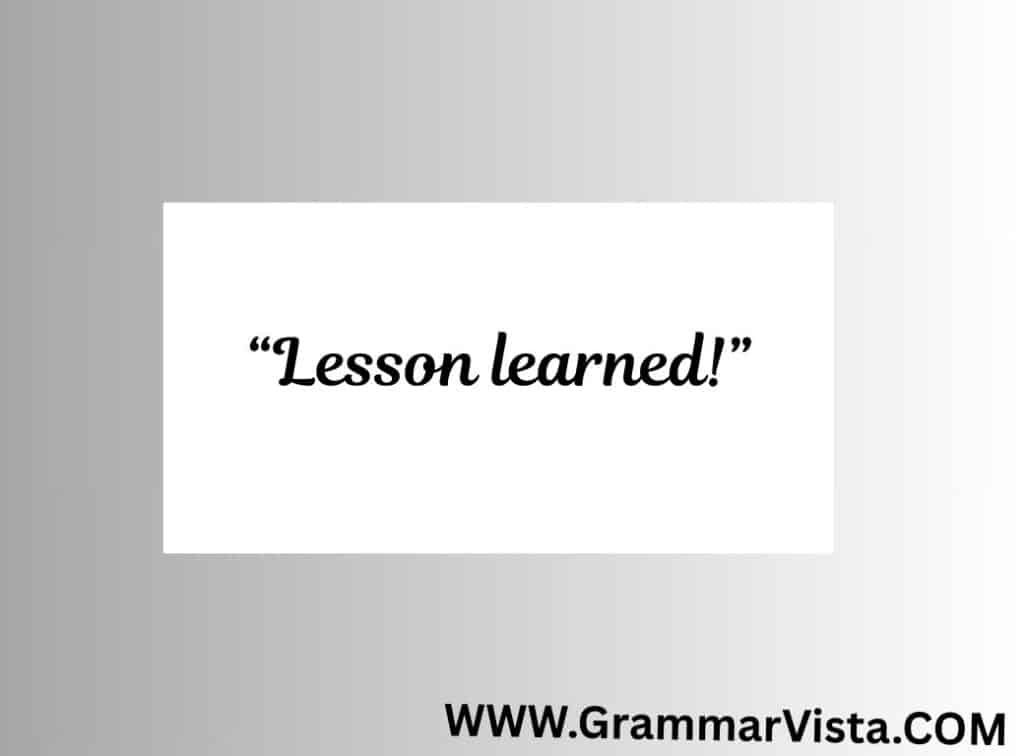
Example: If a colleague points out an oversight in your project, saying “Lesson learned!” can diffuse any tension and shift the focus toward positive growth. It signals that you value feedback and are ready to apply the lesson moving forward.
6. “I’ll make sure to correct it!”
When you want to assure that you’ll address the issue, responding with “I’ll make sure to correct it!” not only shows accountability but also conveys a proactive attitude. This response transforms a moment of criticism into an opportunity for growth and improvement.
It signals to the person offering the critique that you value their input and are committed to making necessary changes. This approach can foster a more constructive dialogue, encouraging others to provide feedback in the future.
Example: Imagine receiving a “tsk tsk” for forgetting a deadline at work. By replying with, “I’ll make sure to correct it! I appreciate your patience as I adjust my schedule,” you turn a potentially awkward moment into a chance to strengthen your professional relationships.
7. “I appreciate the feedback!”
When someone says “Tsk Tsk,” it often carries an air of disapproval, implying that you’ve fallen short in some way. Responding with, “I appreciate the feedback!” can transform a potentially negative exchange into a constructive dialogue.
This response showcases your openness to constructive criticism invites further discussion, allowing you to gain valuable insights. By acknowledging their perspective, you’re effectively turning a moment of judgment into an opportunity for growth.
Example: Consider a scenario where a colleague comments on your presentation skills. Instead of becoming defensive, expressing gratitude for their input creates a more collaborative atmosphere. You might follow up with questions like, “What specific areas do you think I could improve?” This approach demonstrates your willingness to learn and encourages others to share their experiences and tips, fostering a culture of support and continuous improvement.
8. “I’m working on it!”
When someone responds with a “Tsk Tsk,” it often carries a tone of disapproval or disappointment. In such moments, saying “I’m working on it!” can be a powerful statement that acknowledges their concern and reinforces your commitment to personal growth.
This response highlights your active engagement in the process of improvement, suggesting that you are aware of the issue and are taking steps to address it.
Example: If a colleague points out a mistake in a project, responding with “I’m working on it!” not only shows your willingness to correct the error but also invites collaboration. It opens the door for constructive feedback, transforming a potentially negative interaction into an opportunity for learning.
9. “I’ll try to be more careful.”
When you recognize the need for increased attention to detail, responding with “I’ll try to be more careful” can serve as both an acknowledgment of the feedback and a commitment to improvement. This response defuses any potential tension and demonstrates a willingness to learn from past mistakes.
Expressing this sentiment can open the door for constructive dialogue. It invites others to share their insights or strategies for better organization or time management, fostering a collaborative environment.
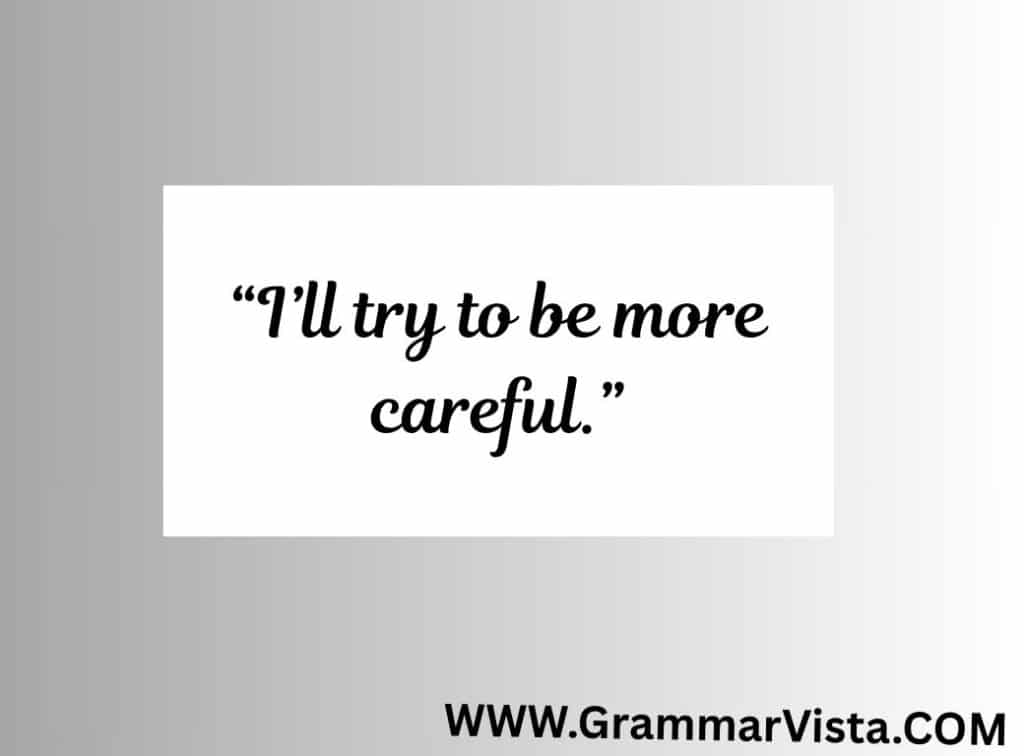
Example: If a colleague points out a missed deadline, this phrase conveys that you value their input and are ready to take responsibility for your actions.
10. “Thanks for catching that!”
When someone offers a “tsk tsk,” it often signals a gentle reminder of a mistake or oversight. Responding with, “Thanks for catching that!” acknowledges their observation and demonstrates your appreciation for their attention to detail. This response fosters a sense of collaboration and respect, transforming a potentially awkward moment into an opportunity for growth.
Example: If a colleague points out a typo in a presentation, saying, “Thanks for catching that!” shows humility and reinforces a team-oriented mindset. It can open the door to more constructive feedback in the future, as it encourages others to feel comfortable sharing their insights.
11. “I’ll keep that in mind.”
When someone delivers a “tsk tsk,” often implying disapproval or a gentle reprimand, responding with “I’ll keep that in mind” can serve as a savvy deflection. This phrase acknowledges their concern and subtly signals that you’re not dismissing their perspective outright.
This response can also open the door for further dialogue. By expressing an intention to remember their advice, you invite them to elaborate on their thoughts, which may lead to deeper insights.
Example: If a friend advises you against taking risks in your career, saying “I’ll keep that in mind” allows you to nod to their caution while maintaining your own autonomy in decision-making.
12. “I see where I went wrong.”
Acknowledging a mistake is an essential part of personal growth, and responding to a “Tsk Tsk” with “I see where I went wrong” showcases your self-awareness. This response defuses any tension and invites a more constructive dialogue. By admitting fault, you open the door for deeper understanding and improvement, turning a moment of criticism into an opportunity for learning.
Example: If a colleague points out a miscalculation in your report, saying, “I see where I went wrong” demonstrates that you value their feedback and are willing to take responsibility. It sends a message that you are committed to excellence and appreciate the input of others.
13. “I appreciate your patience.”
When someone responds with a “Tsk Tsk,” it often signals disapproval or disappointment. In these moments, finding the right words to convey your appreciation for their understanding can transform the interaction. By saying, “I appreciate your patience,” you acknowledge their feelings and shift the tone of the conversation toward a more positive direction.
This response shows that you value their willingness to be forgiving, which can foster a more constructive dialogue.
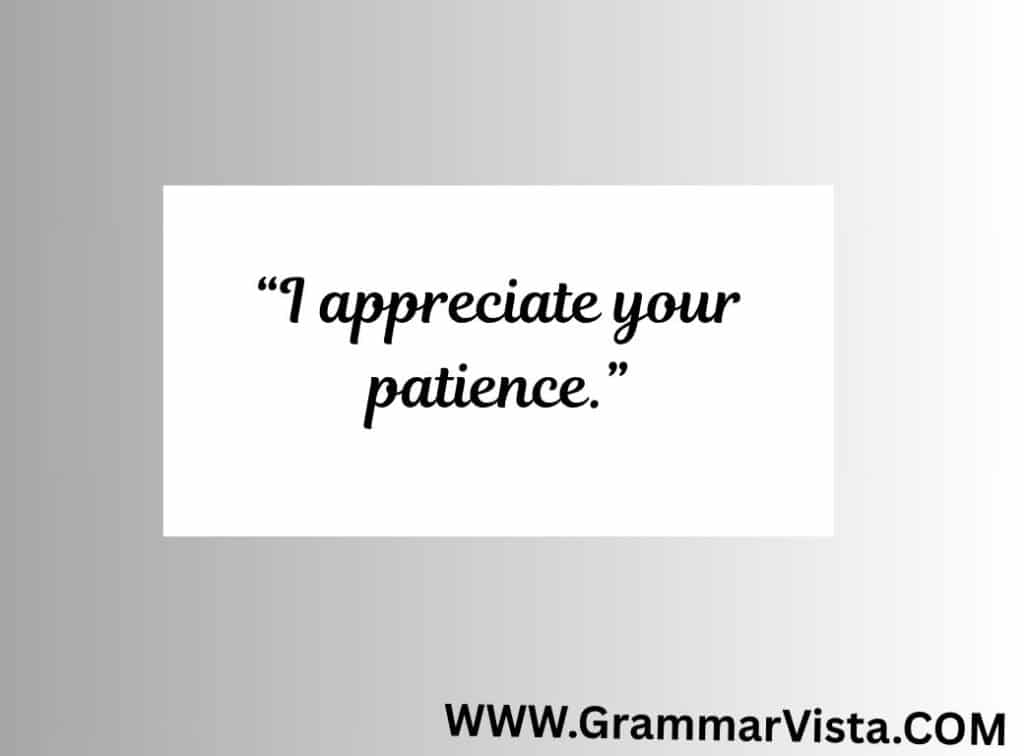
Example: If a colleague points out an oversight in your report with a disapproving sound, responding with, “I appreciate your patience as I sort this out,” demonstrates humility and gratitude. It lets them know you recognize the inconvenience your mistake may have caused while simultaneously inviting them into a collaborative space.
14. “I’ll try not to let it happen again.”
When faced with a “Tsk Tsk,” a response like “I’ll try not to let it happen again” can serve as a powerful acknowledgment of the feedback while simultaneously signaling your intent to improve. This phrase reflects a willingness to learn from mistakes, transforming a moment of criticism into an opportunity for growth.
It shows that you’re not just brushing off the comment but genuinely considering how to evolve and prevent similar situations in the future.
Example: If a colleague points out a missed deadline, saying, “I’ll try not to let it happen again” communicates both humility and determination. It reassures them that you value their input and are committed to maintaining a high standard in your work.
15. “I didn’t mean to cause any trouble.”
When someone responds with a “Tsk tsk,” it often carries a tone of disapproval or disappointment, making it crucial to address the sentiment behind it. A thoughtful reply like, “I didn’t mean to cause any trouble,” can effectively diffuse the tension and communicate that the mistake was unintentional.
This response acknowledges the other person’s feelings and reinforces the idea that your actions were not premeditated, allowing for a more constructive dialogue.
Example: If you accidentally spill coffee on a friend’s favorite book, saying, “I didn’t mean to cause any trouble” conveys sincerity and remorse. It invites empathy rather than anger, prompting your friend to understand that accidents happen.
16. “Thanks for pointing that out.”
It is a response that elegantly combines appreciation with a hint of sarcasm. It acknowledges the other person’s attempt to correct or criticize while subtly suggesting that their input might not be as necessary as they believe. This response works wonders in defusing tension, transforming a potentially confrontational moment into a light-hearted exchange.
Example: If someone comments on your choice of attire with a “Tsk tsk,” responding with, “Thanks for pointing that out; I was going for ‘bold’ today!” showcases your confidence and turns their critique into a compliment about your individuality.
17. “I’ll take that into account.”
When someone delivers a disapproving “tsk tsk,” it often feels like a challenge to defend your choices. Responding with “I’ll take that into account” can transform the interaction from confrontation to constructive dialogue.
This phrase signals that you’re open to feedback, showing maturity and willingness to reflect on their perspective. Using this phrase allows you to maintain your autonomy while still being respectful. It subtly communicates that you’re considering their input without feeling cornered or defensive.
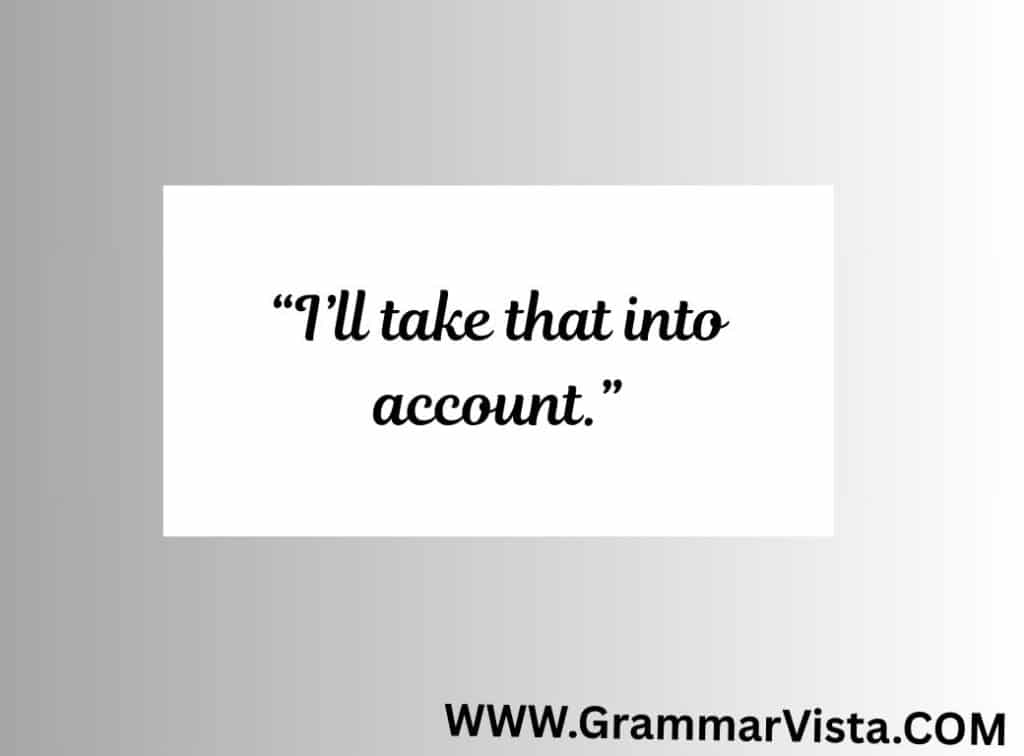
Example: If a friend comments on your spending habits, this response acknowledges their concern and implies you’ll weigh their opinion against your own values.
18. “I didn’t realize it was a problem.”
When someone responds with a “tsk tsk,” it often carries an air of judgment or disapproval. However, a simple yet effective comeback is, “I didn’t realize it was a problem.” This response serves as a form of defense and opens the door to a constructive conversation.
It implies that your actions were unintentional, inviting the other person to share their perspective while also acknowledging your lack of awareness.
Example: If a colleague reprimands you for missing a deadline due to unforeseen circumstances, responding with, “I didn’t realize it was a problem,” can shift the tone of the interaction. It allows you to clarify your intentions and the context behind your actions, fostering understanding instead of conflict.
19. “I’m sorry for the oversight.”
This phrase conveys accountability without being overly defensive, allowing for a more constructive dialogue. Acknowledging the error shows that you respect the feelings of those affected by your actions, which can help rebuild trust.
This response can serve as a bridge to greater communication. It invites others to share their thoughts on how similar oversights can be avoided in the future, transforming a moment of criticism into an opportunity for growth.
Example: If a colleague points out a missed deadline in a meeting, saying, “I’m sorry for the oversight; I appreciate your understanding as I rectify this,” addresses the mistake a opens the door for collaboration moving forward.
20. “I’ll make sure it’s fixed.”
When someone expresses disapproval with a “Tsk Tsk,” it often feels like a gentle reprimand, signaling that you’ve strayed from expectations. Responding with, “I’ll make sure it’s fixed,” acknowledges the concern and demonstrates your commitment to taking responsibility.
This response shifts the focus from the mistake itself to the proactive steps you plan to take, fostering a sense of accountability that can turn a negative situation into a constructive dialogue.
Example: If a colleague points out an oversight in a report, rather than getting defensive, saying, “I’ll make sure it’s fixed,” shows your willingness to learn and improve. It opens the door for collaboration, inviting them to share insights or suggestions that could enhance the final product.
Read more: 20 Best Good Morning Reply for Crush ☀️ (Cute & Flirty Ideas)
Conclusion
Have you ever felt the sting of a “Tsk Tsk” from someone who thinks they know better? This seemingly innocuous sound can carry a world of judgment, but it does not have to silence you. In this guide, we’ll explore 20 clever and witty responses to this common expression of disapproval, helping you reclaim your voice and respond with confidence. By mastering these comebacks, you’ll not only diffuse tension but also showcase your quick wit in everyday situations.

